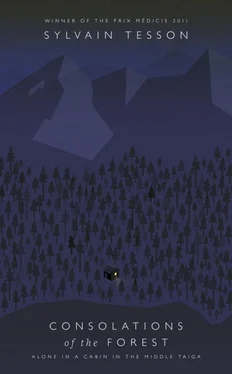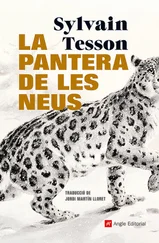The dogs content themselves with endless repetitions. As soon as the event begins to take shape, they drool with impatience. If the unexpected occurs, if a visitor arrives, they growl, bark, attack. The enemy? Novelty.
Sometimes revelations rise from the depths of our own being. Instead of quivering before the signals of the world, we sense an inner impulse, the birth of an idea, an overwhelming desire. Then we feel like a world in ourselves, where gods and demons are locked in battle.
It rains again this afternoon. The clouds blow in from the west and stagnate over the basin of the lake. Off on the Russian plain, the reserves of humidity are apparently inexhaustible. Cawing crows skim the surface of the water, raindrops hammer the shingles, and the taiga seems like an army biding its time. Nature is going through a depressive phase.
In my case, stuck here alive in my wooden coffin, the dreaded hours arrive with the evening. Ghosts and regrets take advantage of the twilight to slip into my heart, launching their operations just when the light fails, at seven o’clock. I need vodka to repel them. Inventory of supplies: I have twenty-two litres of Kedrovaya, three litres of pepper vodka, twelve Partagás, and five cartons of cigarillos (twenty to a box). Enough to fight the demons for a few months.
The courageous course would be to face things: my life, my times and other people. Nostalgia, melancholy, reverie – these give romantic souls the illusion of a virtuous escape route. They pass for aesthetic ways to stave off ugliness but are merely the cache-sexe of cowardice. What am I? Contemptible, frightened by the world, a recluse in a cabin off in the woods. A coward who silently soaks himself in alcohol to avoid witnessing the spectacle of his times or encountering his own conscience pacing up and down along the lakeshore.
16 MAY
Finally, the sky clears. I act like a Russian: for three or four days I’ve been waiting lethargically at the window, and with a bound, I rush outside, the dogs at my heels and three days’ worth of provisions in my backpack. That’s how the Russians cope: long days of inertia interspersed with periods of bustling activity. The ice is still holding up. I cut towards Middle Cedar Cape, intending to head up the valley that debouches there. I leap over the fissures, leaving ever greater margins of safety because the edges are getting thinner. I take refuge from a sudden downpour in the primeval forest that for millions of years has covered the alluvial plain of the river on which I’ve set my sights. My steps sink into the mosses. Ribbons of lichen loop like felt beneath the trees. The forest resembles the marshes of Walter Scott and the exotic undergrowth of The Lost World . The sun comes out to shoot its rays through the swirling fog. Birches line up in ivory aisles. The hardy Rhododendron dauricum gives off the smell of a very clean old lady, which stands out against the earthy odours of stumps clawed open by bears. The forest is full of its own breath. Confused by the profusion of scents, the dogs are beside themselves: Pandora’s box has been opened a crack, and these treasures have seeped out. The Siberian taiga is a cold jungle. The queen of the elves could appear with all her court, parting the curtains of lichen with her hand, and I wouldn’t be at all surprised.
Behind a string of willows in a strangely straight line, I discover a ditch colonized by shrubs. Twenty years ago, a trail linked the camp of some geologists to the lake, and the base mentioned on the map is still here, at 2,300 feet: four derelict izbas and two rusted sheet-metal trailers sit among the saplings. To the north opens a double valley where the thalwegs – the line defining the lowest points along the length of a valley or river bed – are separated by a ridge of stone. I struggle on a scree slope cluttered with dwarf pines, whose branches, lying like a net across the stones, present a supple, impassive wall. I retreat down into the combe, put on my snowshoes, and climb to the base of the rocky ridge. At around 3,300 feet, a shelf seems suitable for a bivouac. A storm breaks out, dumping all the water in the sky on our terrace of schist and granite. I hide the ice axe and crampons a hundred yards below us. The lightning terrifies Aika and Bek, who huddle under a birch tree. I admire them, these little creatures who set off for the mountain happy to be alive, without provisions or plans to return.
I cut strips of dwarf pine to serve as flooring for the terrace, then spend three solid hours trying to light a fire with waterlogged wood. A few pages of Rameau’s Nephew finally catch. (Not the first time that Diderot has set something on fire.) An anaemic flame rises from a tiny pile of shredded bark, dried against my skin. Fire, a poor animal wounded by the storm; I make it grow twig by twig. The flame wavers… and I feel as if I were dealing with a cardiac arrest. The flame grows: victory. I blow on it until I’m dizzy and obtain live coals. The dogs come to warm themselves in the flickering glow. Just when I’m setting up the tent, a fresh cloudburst. I retreat beneath my poorly stretched canvas as hail sparkles into thousands of diamonds during the nano-seconds of lightning. The tent bends, doesn’t collapse, gets drenched. While the tempest bedevils the mountain and my panel of nylon, I learn that Diderot liked to relax every evening in the mellow light of the Palais-Royal. The wind dies down, the storm passes, the stars come back out and, oh joy, the embers are still alive. I stoke the fire and lie down with an anti-bear flare wedged close to my head in case we have visitors. Aika and Bek are curled around each other in the Siberian night like the symbol of yin and yang.
17 MAY
The sun is already high in the sky. The little dogs welcome my awakening. They must be expecting some snack, but I’ve nothing except a bit of bread. It would be best if they returned to the cabin, but they won’t do that, and remain close to me. Dogs take us for their god and their mother, i.e. their master. I break camp and climb along the ridge for five hours. The dogs whine when they’re stopped by a ledge; Aika then finds a way around and guides her clumsier brother. The ridge line straightens out and at 5,250 feet I reach the layer of hardpack. Perched on a boulder, Aika and Bek contemplate the lake.
At the summit, elevation 6,890 feet, it’s gulag cold. To the east, the heart of the nature reserve is revealed. The mountain chain running along Baikal collapses as soon as it crosses to the other side of the ridge. The view to the north grows narrow, running parallel to the shore. Baikal: a cameo set into a shrine. To the east, foothills roll out forests of grey pine, spotted with lakes and streaked with tributaries. The climate out on the taigas is harsher than that of Baikal. Asian timber companies drool over these virgin territories; the Chinese would love to get their hands on such reserves of wood and water, which would be like a second Manchuria for them, since they’ve exhausted the first one. Never in our history has a mass of humanity left a nearby depopulated area rich in resources unexploited for long. History is governed by the laws of hydraulics, and if we set China and Siberia up as hypothetical communicating vessels, Mongolia would be the connecting valve. If there were ever a struggle for control of the taigas here, my summit would make a good surveillance post. The Chinese will have the advantage of numbers and hunger; the Russians will have backwoods inaccessibility and their hatred of any threat to mat rodina , the motherland. The little dogs, noses tucked into their fur, are fast asleep.
We go back down through the northernmost canyon. At the halfway point, the walls draw together and a sudden forty-five degree dip in the slope forces me to cut steps in the snow. The dogs whimper, unable to advance. Then Aika launches herself onto the slide, counting on me to stop her, which I do, and Bek as well. The technique Aika has devised works well, and we reach the foot of the wall. Towards the bottom of the valley, I rejoin my tracks from yesterday, which have been crossed – and recently – by a bear: the prints are deep and the animal seems not to have shown the slightest interest in my trail. At the edge of the wood, the tongue of snow over the torrent has broken open, spitting out its flood of clear water. I make a fire to dry my clothes and nap in the wonderful sunshine.
Читать дальше












